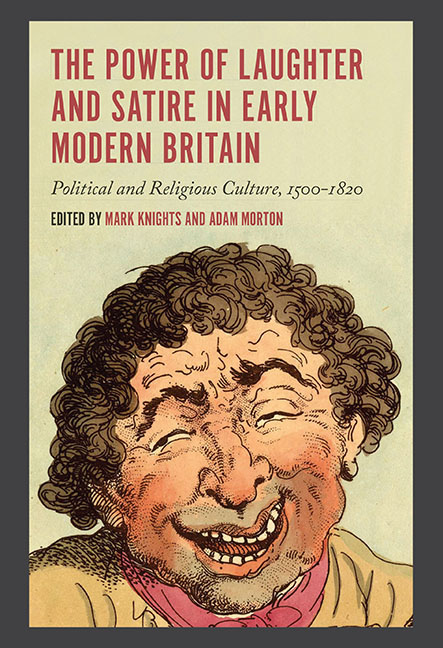Book contents
- Frontmatter
- Contents
- List of Illustrations
- List of Contributors
- Acknowledgements
- List of Abbreviations
- Introduction: Laughter and Satire in Early Modern Britain 1500–1800
- 1 Dissolving into Laughter: Anti-Monastic Satire in the Reign of Henry VIII
- 2 Mocking or Mirthful? Laughter in Early Modern Dialogue
- 3 Farting in the House of Commons: Popular Humour and Political Discourse in Early Modern England
- 4 Continuing Civil War by Other Means: Loyalist Mockery of the Interregnum Church
- 5 Laughter as a Polemical Act in Late Seventeenth-Century England
- 6 Spectacular Opposition: Suppression, Deflection and the Performance of Contempt in John Gay's Beggar's Opera and Polly
- 7 ‘Laughing a Folly out of Countenance’: Laughter and the Limits of Reform in Eighteenth-Century Satire
- 8 Nervous Laughter and the Invasion of Britain 1797–1805
- 9 ‘Was a laugh treason?’ Corruption, Satire, Parody and the Press in Early Modern Britain
- Bibliography
- Index
2 - Mocking or Mirthful? Laughter in Early Modern Dialogue
Published online by Cambridge University Press: 01 September 2018
- Frontmatter
- Contents
- List of Illustrations
- List of Contributors
- Acknowledgements
- List of Abbreviations
- Introduction: Laughter and Satire in Early Modern Britain 1500–1800
- 1 Dissolving into Laughter: Anti-Monastic Satire in the Reign of Henry VIII
- 2 Mocking or Mirthful? Laughter in Early Modern Dialogue
- 3 Farting in the House of Commons: Popular Humour and Political Discourse in Early Modern England
- 4 Continuing Civil War by Other Means: Loyalist Mockery of the Interregnum Church
- 5 Laughter as a Polemical Act in Late Seventeenth-Century England
- 6 Spectacular Opposition: Suppression, Deflection and the Performance of Contempt in John Gay's Beggar's Opera and Polly
- 7 ‘Laughing a Folly out of Countenance’: Laughter and the Limits of Reform in Eighteenth-Century Satire
- 8 Nervous Laughter and the Invasion of Britain 1797–1805
- 9 ‘Was a laugh treason?’ Corruption, Satire, Parody and the Press in Early Modern Britain
- Bibliography
- Index
Summary
Rideo, risi, ridere, to laughe: also to skorne or mocke
Rire: laugh, tighie; geere, fleere, mocke, ieast, or scoffe at: make himself merrie with
Introduction: The Ambivalence of Laughter
Early modern dictionaries not only capture the ambivalence of laughter: through the preponderance of negative synonyms that they list – scorn, mock, jeer, fleer, scoff – they also encapsulate its strong association with derision, a word etymologically linked to the Latin ‘ridere’. This derisive strain is evident, for instance, in the way that – in the example above – Randle Cotgrave chose to group ‘ieast’ with verbs utilising the preposition ‘at’, rather than ‘with’. Even his onomatopoeiac ‘tighie’ (‘tee-hee’) is far from neutral, defined by the OED as indicating ‘the sound of a light laugh, usually derisive’. It is this disdainful perception of laughter that dominates early modern discussions of the phenomenon. As Quentin Skinner notes, ‘with the recovery of the classical theory of eloquence – one of the defining achievements of Renaissance culture – the classical theory of laughter was likewise revived’. This was a theory that associated laughter, above all, with contempt: Plato's Republic ‘foreshadows the central principle of Aristotle's analysis when he declares that laughter is almost always connected with the reproving of vice’; Cicero's De Oratore restricts laughter ‘to matters that are in some way either disgraceful or deformed’; Quintilian's De Institutione finds that laughter ‘has its source in things that are either deformed or disgraceful in some way’. Thomas Wilson consequently drew on a long-established tradition when he declared in 1553 that: ‘The occasion of laughter, and the meane that maketh vs merie […] is the fondnes, the filthines, the deformitee, and all suche euill behauior, as we se to bee in other.’
Regarded as a ‘merie’ response to regrettable things, there is thus a duality to early modern conceptions of laughter. This can be seen in Laurent Joubert's Traité du Ris, initially written in Latin in the 1550s and first printed, translated into French, in its complete form in 1579.
- Type
- Chapter
- Information
- The Power of Laughter and Satire in Early Modern BritainPolitical and Religious Culture, 1500-1820, pp. 48 - 66Publisher: Boydell & BrewerPrint publication year: 2017
- 1
- Cited by



